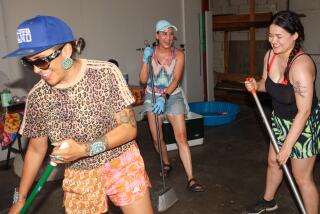Upbeat Hopes for Kerouac’s Florida Pad
- Share via
ORLANDO, Fla. — After the publication of “On the Road,” Jack Kerouac came off the road to settle here, in a tin-roofed cottage tucked under the long, graceful arms of a live oak tree.
And it was here in 1957, as he wrote his follow-up novel, “The Dharma Bums,” that fame overtook him. By the time Kerouac and his mother, Gabrielle, moved on from their year in this College Park neighborhood, he not only had coined the term “beat generation,” but also had become its literary star.
This city doesn’t make much of its Kerouac connection. Neither the writer nor the house on Clouser Avenue is mentioned among tourist attractions touted by the Orlando/Orange County Visitors & Convention Bureau.
But Marty Cummins wants to change that by adding the name Kerouac to the list that includes Disney, Mickey and Shamu.
“We have a chance to raise the level of literature in central Florida,” said the 47-year-old Cummins, owner of Chapters bookstore. “To our knowledge, Orlando is the only American city of its size without a book fair or a charity book sale. This is an opportunity for us.”
What Cummins has in mind is to turn the house Kerouac once rented into a refuge where others can write. The Jack Kerouac Writers in Residence Project already has taken a mortgage on the $120,000 property, which includes the cottage and a smaller house. Later this summer, the project will begin accepting applications from aspiring or established writers who want a quiet place to work.
The first writer-in-residence could be enjoying free room and board by fall. “We don’t care what they do while they live in the house,” Cummins said. “We’re going to recognize talent.”
Eventually, Cummins said, the project could put writers on the road--with a car, credit cards for gasoline and lodging and a mapless mandate to look around. “I would love to provide writers with the freedom to experience America the way Kerouac did,” Cummins said. “No requirements on what or when they write. Just free to enjoy the country and its people.”
Of course, America has changed since Kerouac and his pals--Neal Cassady, Allen Ginsberg, William Burroughs, Gary Snyder and others--were speeding across the country in the 1940s and 1950s, exuberant hipsters, stoked on benzedrine and Charlie Parker and hungry for a new Zen vision of life and art.
“The only people for me are the mad ones,” Kerouac wrote in “On the Road,” “the ones who are mad to live, mad to talk, mad to be saved, desirous of everything at one time, the ones who never yawn or say a commonplace thing, but burn, burn, burn like fabulous yellow Roman candles exploding like spiders across the stars.”
Plenty of Cultural Space
Today’s explosions are scheduled--at Disney World, Universal Studios, Sea World and other theme parks offering scripted entertainment that seems the antithesis of the “bop visions” Kerouac chronicled. Those attractions lure more than 37 million visitors a year, making the Orlando area a top tourist destination.
But the majority of those attractions actually are in another county, and Cummins sees in this leafy city plenty of cultural space for a writer considered a seminal figure in American literature. Despite Truman Capote’s famously dismissive one-line review of Beat Generation writers: “[It] isn’t writing at all--it’s typing,” Kerouac’s works still sell 100,000 copies a year.
Cummins--who left a law career in Columbus, Ohio, and opened the bookstore 2 1/2 years ago with his wife, Jan--said that, although civic officials have been cool to the project, popular support is growing.
Next month, composer and onetime Kerouac collaborator David Amram is to perform at a festival designed to raise $10,000 to renovate the wood-frame house. Five area Borders bookstores will donate (at a customer’s request) 15% of sales that weekend to the project.
“I think Jack would have loved the idea of the house,” said Kerouac’s brother-in-law John Sampas, executor of the writer’s estate. “He always felt that someday literary people would honor and celebrate him.”
When he died in 1969 from the effects of alcoholism, Kerouac and his mother lived in St. Petersburg, about 100 miles to the west. He was 47.
But some Orlando neighbors remember him still. “I saw him heading off down the street with a duffel bag one day,” recalled Audrey Redding, a friend of Kerouac’s mother. “And Gabrielle told me, ‘Oh, he’s off to Mexico to write a book.’ ”
*
Times researcher Anna M. Virtue contributed to this story.
More to Read
Sign up for our Book Club newsletter
Get the latest news, events and more from the Los Angeles Times Book Club, and help us get L.A. reading and talking.
You may occasionally receive promotional content from the Los Angeles Times.










